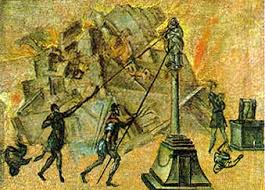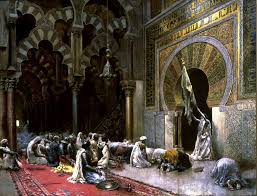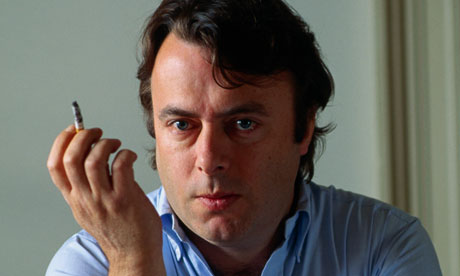
One of the key features of the book religions is iconoclasm—literally, idol smashing. The ancient Hebrews developed a dislike for statues and images sometime in the first millennium BCE, and after occasionally reverting to worshiping them decided to prohibit them outright because their God “was a jealous god, above whom, there can be no others” (Exodus 20,4).
This was more wishful thinking than fact, since in military encounters with the many-godded nations that surrounded them Israel habitually lost to these other gods.
The Christians tried for a while to ignore their rich pagan legacy of temples and statues, but finally succumbed to the temptation to make icons, name churches after saints, and produce thousands of images to encourage their veneration.

Later, Christians in the East decided to clamp down on the practice, finding it more than a little like the idol-worship condemned in the Decalogue. And later still, during the Reformation, Christians in the West went through various spasmodic attempts to cleanse the protestantized churches of their statuary and altars and demolish the monasteries that had become factories for producing them.
In its early days, Islamic iconoclasm expressed itself in refitting Christian churches as mosques, chipping away at mosaics, whitewashing frescoes, converting bell towers and baptisteries into minarets, as well as effacing (literally cutting the nose off) Christian statues. Catholic Christians in turn reclaimed more than a few churches, especially in Spain, and duly set about giving them new altars and stony or chalky saints.

Hence What is happening in Syria and Iraq with the destruction of the antiquities at Nimrud and Hatra has a history. But it is a history with a difference. Radical monotheism has always expressed itself as an incentive to destroy the shrines of your religious enemies It is a tangible way of saying that my beliefs are better than yours–that my doctrine is the right doctrine, based on my book and my revelation—which are also right where yours is wrong. Only love and religion produce such strong emotional extremities of beauty and destruction.
But one should not be be misled by the mere fact that iconoclasm has a history: religious rivalries of the kind I have described happened in the real time of contemporaneous disputes; they constituted a kind of ritual and theological warfare between living religious movements. The wholesale attack on the civilization of the planet in the name of religion–the artistic and aesthetic murders we are witnessing–are scarcely related to any dispute anyone in the contemporary world is having or wants to have–religious, theological or otherwise. To most onlookers, shredding manuscripts and hammering 3000 year old artefacts to powder is not an event we can locate in a contemporary matrix or in the lexicon of irrational and savage behaviour. It has the irrationality of a tornado without any of the natural beauty of a violent, natural storm. That is because we do not expect storms to be rational. We expect humans to be rational.
Many of my Muslim friends are aghast at what is going on in the Middle East, just as the world was aghast in 2001 at the dynamiting of the sixth-century CE Buddhas in Bamiyan, Afghanistan. There is something especially sickening about these displays of the craven mind, especially because the ones affected by this assault on history are not affected out of religious devotion to ancient images but because they know that antiquity is physically limited: we instinctively know there is a moral imperative to preserve these uncommon treasures of our human past. That is where the revulsion comes from.

Yet the generality of the Muslim world can only come up with feeble scolds like “Unislamic” to describe what is being done by madmen to restore Islam to its native purity and intolerant righteousness. And when we search for appropriate analogies, as Barack Obama absurdly tried to do recently, we are instructed that it “hasn’t been long ago since Christians and Jews did violent things in the name of religion”–a platitude so venomously inexact that it can only have been spoken by a politician. Mr Obama’s larger point seems to have been that no religion has a monopoly on violence. Yet to the casual observer, the thought that irate Presbyterians or Chasidic Jews would today burn “apostates” in cages or take sledgehanmmers to priceless relics of the past seems more than a little far-fetched,
What’s the Matter with Ahmed? A World without a Past
The actual modus operandi of Islamic state is a radical belief in the “totalizing imperative.” It incorporates into its monotheism both the largely defunct Jewish doctrine of election (the belief that a god chooses some people, nations, or forms of belief over others), the Christian mission to “evangelize” the world to believe in a unique message of salvation, together with a driving obsession with the finality of its eschatological vision: There is no god but Allah; no Prophet beside or after Muhammad; and no revelation outside the Quran.
For some Muslims, like the branch of Islam represented by Islamic State, the entail of this finality is that there is also only one correct interpretation of this profession of faith: not only Christians or unbelievers must be converted or face death, but also other Muslims who adhere to a heretical variant of the Takfirist-Salafist form of Sunni Islam to which they belong. However, understanding the ideological species of Islam that IS represents does not explain their success, their growing popularity with Muslim youth from a variety of sectarian backgrounds, or the brutishness of their methods.

Theologically, both in its normal and “extreme” iterations Islam only superficially resembles Christianity. The intuition of most Jews and Christians that Islam is ontically different from the other book traditions is actually a fairly precise judgment. Islam is not “where” Christianity was five hunded years ago or a thousand years ago. It is not a religion poised on the brink of reformation, enlightenment, and modernity but a religion whose cardinal assumptions seem to drive it repeatedly back into the cavernous recesses of its beginnings. The most startling example of this recidivism is its view of history.
Judaism values its history as a history of suffering, almost uninterrupted between the Exile of the sixth century BCE and 1945. But in dispersion, Jews came to see the value of history: history became their home, the Bible the sentimental record of their own contribution to civilization. The Persians, the Syrians and for a while the Romans–all immersed in their own national mythologies–permitted the Jews their cult, their temple, even the illusion of having “kings,” but no Jewish civilization arose out of Jerusalem or the dead north of Samaria. By the second century of our era it had virtually disappeared from the map. The historical destiny of Jews was expressed in their story as wanderers, survivors, and eventually in scholarship and ethics. Jews were in history, as Eric Osborn once said of the biblical tradition, like a fish is in water.
Christianity given the choice between discarding the Hebrew legacy of their “Old” Testament or accepting it, accepted it in a symbolic and prophetic way—but at a time when Judaism too was beginning to understand religious origins more liberally, as though both faiths had a mechanism for self- correction and adaptation. For all the murderous petulance that characterized Jewish-Christian relations from the time of the Crusades to the time of the Inquisition to the Holocaust, Christians clung stubbornly to the premise that they were honorary Jews, adopted sons and daughters of the promise made to Abraham. That is, they shared a common history of salvation, and one of the ways they were able to do this was grounded in the preservation of history and the acceptance over time of the transformative power of civilization through (sometimes cautious) acceptance of learning. It is fair to say that both Judaism and Christianity today are essentially ethical movements whose doctrines and protagonists—up to and including God himself—are symbolic statements of what Paul Tillich once described as “ultimate concern.” The existence of literalist strains of Christianity and Judaism do not undermine this essential pattern of demythologizing and adaptation.

The scenes out of Iraq show us the demonic side of monotheism: the desire to erase history as a way of laying claim to finality. In Islam, the Qur’an is the final book, Muhammad the final prophet and the straight path of Islam the only path. It is true that Judaism and Christianity once believed similarly rigid things about their truth- claims, but both of the original monotheisms underwent political and social disconfirmation that made it impossible to sustain the original doctrines in their original form or with the same intensity. Historical reality became the mechanism for adaptation and correction. Judaism for example was never a “resurrection” faith even in the time of Jesus. Its messiah was never an otherworldly figure, except after hopes of a this-worldly deliverer began to vanish. Picking up on the minor theme of a divine son of God and messiah, Christianity too began in disappointment—its saviour had been executed by the Roman magistracy in Palestine with the collusion of Jewish leaders. He had saved nobody, alienated many, and died an agitator and tax rebel. This disappointment was rationalized (with plenty of help from popular Jewish apocalyptic texts) into a belief in a “second coming” when “all will be revealed”—a belief that could not be sustained over thousands of years of non-fulfillment. In short, the core doctrines of Christianity and Judaism were disconfirmed by historical outcomes that could not have been foreseen in 700 BCE or 1000 CE. History chipped enthusiasm down to size and taught these religions to live in a world that was increasingly demystified by science and explicable without the need for religion.
By contrast, the self-definition of Islam in its most extreme form–that it is final in every respect—has not been disconfirmed. It is axiomatic that it cannot be. Islam is counter-culturally and trans-historically true. And because the Salafi form of Islam does not recognize the analogy of its experience in Jewish and Christian antecedents (perhaps the most blatant example of its irrationalism) its zealots believe that they can effectively usher in the conditions for the Judgement. They will do this by submitting fully to their interpretation of the will of Allah as announced by his human vizier, Abu Bakr al-Baghdadi, otherwise known as the Caliph Ibrahim.

They will do this by beheading unbelievers, torching heretics, forcing teenage girls into marriage with Muslim fighters. They will do this by executing Shia Muslims, destroying the Assyrian Christians and their churches and homes, torturing and killing the Mandaens and Yazidis who have hung on by their nails for over a thousand years of persecution and indifference. They will do this by smashing the priceless treasures of the ancient Akkadian Near East in Mosul’s Museum, and bulldozing the sites of ancient Nineveh and Nimrud, including the Mosque of the Prophet Jonah in Mosul. They will do this by destroying thousands of books and manuscripts in Mosul’s libraries. Just as they have already done it by destroying Hatra using explosives and bulldozers. One attacker was filmed declaring,
“These ruins that are behind me, they are idols and statues that people in the past used to worship instead of Allah. The Prophet Muhammed took down idols with his bare hands when he went into Mecca. We were ordered by our prophet to take down idols and destroy them, and the companions of the prophet did this after this time, when they conquered countries.” (Morgan Winsor (5 March 2015). “ISIS Destroys Iraqi Archaeological Site Of Nimrud Near Mosul”. IBT. Retrieved 8 March 2015.)
In the ISIL vision of the world, pre-Islamic history must not exist. Indeed it does not exist. In their world every trace of a history that does not corroborate their narrow definition of the truth is demonic: it must be erased, destroyed, turned to rubble because God the all-powerful must (somehow) be threatened by 3000 tear old artefacts that stand deserted and quiet in the sands of Iraq . History in their religious universe is a kind of illusion, a deception sent by the devil to distract earlier races and people from the true faith. It cannot be preserved. It must be erased, repealed. History is the incarnation of the Unislamic, and the the pre-Islamic is the greater part of that intolerable period before Allah revealed his will to the final Prophet. The only position for a believer, on this calculation, is to regard art, architecture, music, science, free inquiry and philosophy as heretical, while rape, arson, torture, destruction, beheading and violence (aided, to be sure by smart phones and slick media presentations) is the will of God.
The poisonous logic of the Caliph Ibrahim and his ISIL fighters is that by burying the remains of the past the past will lie still and stay dead. But quite the opposite is happening: ruins that are largely untended in the Iraqi desert are now objects of veneration to millions who had never heard of them, and their ancient ghosts have been set free to roam and haunt the modern palaces of government and civilization–and more importantly, the modern consciousness. No religion proves it is the fulfillment of history by hiding the evidence of the history that came before it. That is called lying. Deception. It is what the Islamic State is based on and, when it lay still and permanently dead in the destruction it has wreaked, what it will be remembered for.


_-_WGA11500.jpg) What concerns me most about the misapplication of the word ‘humanist’ to full frontal atheists is that most such humanists are not humanists at all. Not in any meaningful sense. To be solipsistic about it, if they were they would not be full frontal atheists.
What concerns me most about the misapplication of the word ‘humanist’ to full frontal atheists is that most such humanists are not humanists at all. Not in any meaningful sense. To be solipsistic about it, if they were they would not be full frontal atheists.

